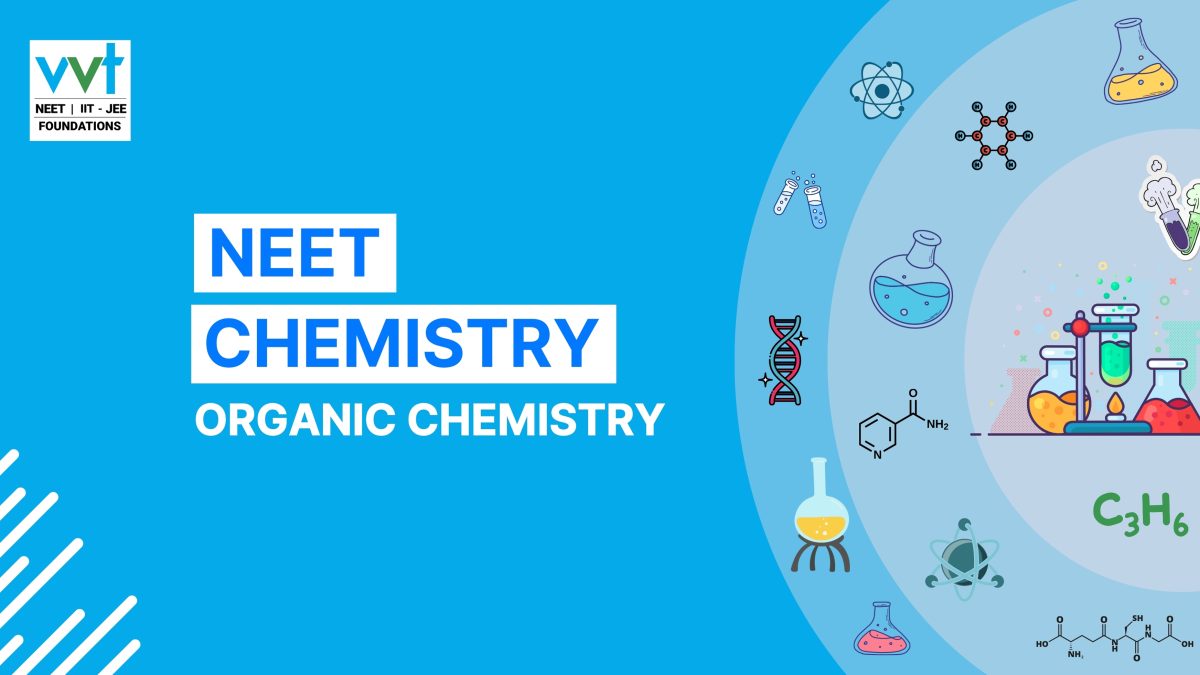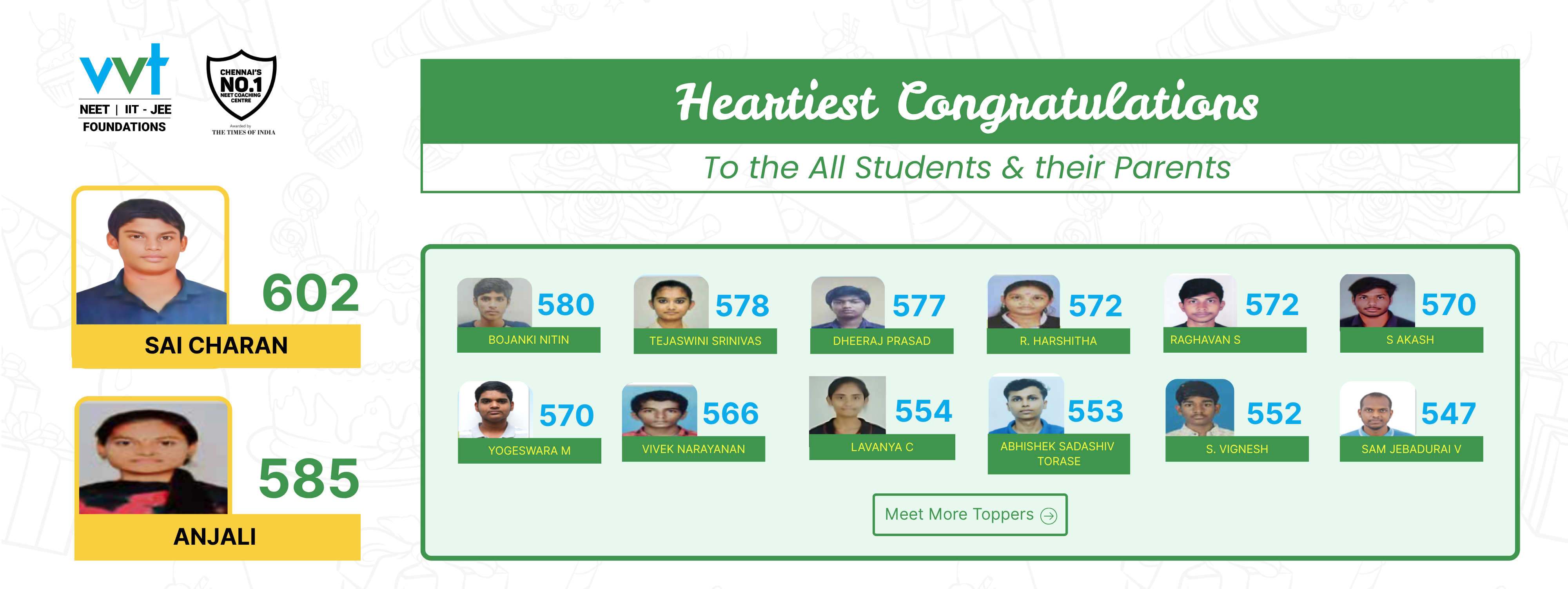
NEET Chemical Bonding and Molecular Structure: Notes and Tips by VVT Coaching
March 6, 2025
Aldehydes, Ketones, and Carboxylic Acids for NEET: A Deep Dive into Named Reactions and Mechanisms
March 8, 2025Mastering Organic Chemistry for NEET: An In-Depth Guide by VVT Coaching
VVT Coaching Chennai – Ranked #1 Best NEET Coaching Centre by Times Now!
Cracking NEET 2025 requires a strong command over Organic Chemistry, a vital component of the Chemistry section that can significantly elevate your score. With the right strategies and expert support, you can transform this complex subject into one of your strongest assets. At VVT Coaching Chennai, we provide students with comprehensive guidance, tailored study plans, and proven techniques to master Organic Chemistry with ease.
This guide dives deep into the essentials of Organic Chemistry, unraveling key concepts, offering practical tips, and equipping you with the skills to tackle NEET-level questions confidently. Whether it’s decoding reaction mechanisms or mastering nomenclature, VVT Coaching ensures you’re fully prepared to excel and boost your overall NEET performance.
Why Organic Chemistry Matters for NEET
Organic Chemistry is a high-scoring opportunity that tests your understanding of chemical reactivity and problem-solving skills. With a solid grasp of its core concepts, you can secure a significant portion of your Chemistry marks.
At VVT Coaching, we simplify complex ideas with structured lessons, detailed examples, and practical strategies to ensure you excel.
Here’s What we’ll cover:
- Basics: Carbon’s role, hydrocarbons, and functional groups.
- IUPAC Nomenclature: Systematic naming rules.
- Electron Displacement Effects: How electrons drive reactivity.
- Reaction Mechanisms: Step-by-step reaction pathways.
Let’s dive in!
Section 1: Organic Chemistry Basics for NEET
Organic Chemistry studies carbon-containing compounds (excluding simple oxides and carbonates). Carbon’s unique properties—tetravalency, catenation, and multiple bonding—create a vast array of molecules. Here’s a deep dive into the essentials:
The Central Role of Carbon
- Tetravalency: Carbon’s four valence electrons allow it to form four covalent bonds, enabling diverse structures like methane (CH₄).
- Catenation: Carbon bonds with itself to form chains or rings, as seen in cyclohexane (C₆H₁₂).
- Multiple Bonding: Single (-C-C-), double (-C=C-), and triple (-C≡C-) bonds influence reactivity, e.g., ethyne (C₂H₂) is more reactive than ethane (C₂H₆).
Hydrocarbons: The Foundation
Hydrocarbons, made of carbon and hydrogen, are classified as:
.Alkanes: Saturated, single bonds (e.g., propane, C₃H₈). Inert and nonpolar.
.Alkenes: Unsaturated, double bonds (e.g., propene, C₃H₆). Reactive in addition to reactions.
.Alkynes: Unsaturated, triple bonds (e.g., propyne, C₃H₄). Highly reactive.
Functional Groups: Reactivity Drivers
Functional groups dictate a compound’s behavior.
Here’s a comprehensive table:
| Functional Group | Formula | Example | Properties | NEET Relevance |
| Alkane | -C-C- | Ethane (C₂H₆) | Inert, nonpolar | Structural basics |
| Alkene | -C=C- | Ethene (C₂H₄) | Reactive, addition reactions | Reaction intermediates |
| Alkyne | -C≡C- | Ethyne (C₂H₂) | Reactive, acidic | Synthesis questions |
| Alcohol | -OH | Ethanol (C₂H₅OH) | Polar, hydrogen bonding | Solubility, reactivity |
| Aldehyde | -CHO | Ethanal (CH₃CHO) | Oxidizing agent | Carbonyl chemistry |
| Ketone | I – C=0 | Propanone (CH₃COCH₃) | Solvent, less reactive | Identification tests |
| Carboxylic Acid | -COOH | Ethanoic Acid (CH₃COOH) | Acidic Nature | Acidity trends |
Practical Foundations
- Distillation: Separates liquids (e.g., ethanol purification).
- Chromatography: Identifies compounds (e.g., TLC for purity).
- NEET Tip: Expect questions on functional group properties or basic lab techniques.
Section 2: Mastering IUPAC Nomenclature
IUPAC nomenclature is essential for naming organic compounds accurately in NEET. Here’s a step-by-step guide:
Naming Rules
- Longest Chain: Identify the parent chain (e.g., CH₃CH₂CH₂CH₃ = butane).
- Numbering: Start at the end giving substituents the lowest numbers (e.g., CH₃CH(OH)CH₃ = propan-2-ol).
- Substituents: Prefixes like methyl- (e.g., CH₃).
- Functional Groups: Suffixes like -ol (alcohol), -oic acid (carboxylic acid).
- Multiple Groups: Use di-, tri-, and alphabetical order (e.g., 2,3-dimethylbutane).
Examples
- CH₃CH₂CH(CH₃)CH₂OH: 4 carbons (butane), -OH on C1, -CH₃ on C3 → 3-Methylbutan-1-ol.
- CH₂=CH-CH₂-CH₃: 4 carbons, double bond at C1 → But-1-ene.
Section 3: Electron Displacement Effects
Electron movement controls reactivity. Here’s an in-depth look:
Key Effects
- Inductive Effect: Permanent electron shift.
- +I: Electron-donating (e.g., -CH₃).
- -I: Electron-withdrawing (e.g., -Cl in CH₃CH₂Cl).
- Impact: Increases acidity (e.g., ClCH₂COOH > CH₃COOH).
- Resonance: Electron delocalization (e.g., benzene’s stability).
- Hyperconjugation: Sigma bond interaction with pi systems (e.g., (CH₃)₃C⁺ stability).
Comparison
| Effect | Nature | Example | NEET Application |
| Inductive | Permanent | CH₃Cl | Acidity trends |
| Resonance | Delocalized | Benzene | Reaction intermediates |
| Hyperconjugation | Temporary | CH₃CH=CH₂ | Carbocation stability |
Section 4: Reaction Mechanisms
Mechanisms explain bond changes. Here are the key types:
Substitution
- SN1: Two steps, carbocation intermediate (e.g., (CH₃)₃CCl → (CH₃)₃COH).
- SN2: One step, inversion (e.g., CH₃CH₂Br + OH⁻ → CH₃CH₂OH).
Elimination
- E1: Two steps, alkene formation (e.g., (CH₃)₃COH → (CH₃)₂C=CH₂).
- E2: One step, Zaitsev’s rule (e.g., CH₃CH₂CHBrCH₃ → CH₃CH=CHCH₃).
Table
| Mechanism | Steps | Substrate | Example |
| SN1 | 2 | Tertiary | (CH₃)₃CCl + H₂O |
| SN2 | 1 | Primary | CH₃CH₂Br + OH⁻ |
| E1 | 2 | Tertiary | (CH₃)₃COH → (CH₃)₂C=CH₂ |
| E2 | 1 | Secondary | CH₃CH₂CHBrCH₃ + OH⁻ |
Section 5: Study Tips from VVT Coaching
- Prioritize: Focus on mechanisms (3-4 questions) and nomenclature (2-3 questions).
- Resources: Use NCERT and VVT Coaching’s structured notes (http://www.vvtcoaching.com/).
- Plan: Weeks 1-2: Basics; Weeks 3-4: Mechanisms; Weeks 5-6: Practice.
Download and practice free MCQs
| Organic Chemistry-some Basic Principles And Techniques | ||
| Question | Answer Key | Solutions |
| ELECTRON DISPLACEMENT EFFECTS | ELECTRON DISPLACEMENT EFFECTS- Answer key | ELECTRON DISPLACEMENT EFFECTS- Solution |
| G.O.C-IUPAC NOMENCLATURE | G.O.C-IUPAC NOMENCLATURE -Answer Key | G.O.C-IUPAC NOMENCLATURE – Solution |
| ORGANIC CHEMISTRY | ORGANIC CHEMISTRY -Answer Key | ORGANIC CHEMISTRY – Solution |
Conclusion: Mastering Organic Chemistry with VVT Coaching
Excelling in Organic Chemistry for NEET requires a strategic study plan, consistent practice, and expert guidance. By focusing on key concepts, nomenclature, electron effects, and reaction mechanisms, you can transform this challenging subject into a high-scoring opportunity.
At VVT Coaching Chennai, our experienced faculty provides structured study plans, personalized mentoring, and top-tier resources to help you master Organic Chemistry with confidence and precision..
Join VVT Coaching Chennai today and take the first step toward achieving your medical dream with expert support every step of the way!
Also check:
- NEET Chemistry Chapter-wise and Concept-Wise Weightage
- .NEET Chapter Wise Weightage 2025: Complete Guide with Important Chapters
- Last 60 Days NEET Strategy: Smart Revision Tactics
FAQs for NEET Students
Start with NCERT basics, use flowcharts for mechanisms, and practice daily with VVT Coaching’s structured notes.
2.What’s the most tested topic in Organic Chemistry for NEET?
Reaction mechanisms (SN1, SN2, E1, E2) and carbonyl compounds.
3.How can VVT Coaching help?
We offer expert-led classes, concise notes, and personalized doubt-solving sessions.












